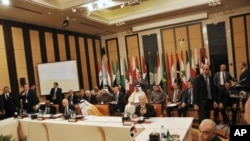Arab League officials have demanded Syria abide by its agreement to end violence against civilians and have vowed to carry on with a monitoring mission that many in the Syrian opposition feel is ineffectual.
In their first review of the Arab League's observer mission in Syria, regional foreign ministers took few concrete steps that would put additional pressure on Damascus.
Officials at the Cairo meeting had been expected to discuss possible U.N. technical help, a step towards bringing in additional nations to deal with Syria's brutal crackdown on a popular uprising.
But one of the most outspoken critics of the Syrian government, Qatar's Sheikh Hamad bin Jassin al-Thani, warned the monitoring mission is not open-ended, adding officials have a rough idea of when they will decide no further progress can be made. "But I do not think it is wise to announce this date. We do not want to threaten anybody. We are trying to cooperate with everybody, until we achieve peace in Syria, which up until now we are not satisfied [about] and I cannot see it," he said.
The Qatari prime minister, who also serves as foreign minister, said the league is doing its best, but the results are not ideal. He called for the Syrian government to stop the "bloodbath.
The mission began late last month to oversee Syria's compliance with a league peace plan, but the opposition reports several hundred more civilian deaths since their arrival. The United Nations estimates about 5,000 civilians have been killed in 10 months of unrest.
Opposition members, including protesters outside the Cairo hotel where the meeting was held Sunday, say the observers are being tricked by Syrian officials who allegedly order attacks on civilians halted while the monitors make their rounds, only to resume the assaults once league officials move on. Syria had vowed to withdraw its military from the streets, but opponents say soldiers have simply donned police uniforms and disguised their vehicles.
Some Arab League diplomats have been calling for U.N. help to better train the monitors to carry out their assignment, or possibly accompany them.
The United Nations is set to meet Tuesday to discuss the situation, but opponents of intervention, most notably Russia, say they would rule out even technical assistance.
A Russian flotilla was reported to have docked Sunday at the Syrian port of Tartus, in an apparent show of support for the government. But some political observers believe that outside intervention is inevitable.
American University of Beirut Political Science Professor Hilal Khashan says he does not expect the league monitors will implicate the Syrian government. "I think their activity will go on and it will be inconclusive. Eventually the international community will have to do something about the situation in Syria because the Arab League is not equipped to deal with the situation," he said.
Khashan says time is on the Syrian government's side, and the longer it takes to mount effective external pressure, the more the leadership in Damascus hopes it will not go the way of its former counterparts in Cairo or Tunis. "The regime feels that if they continue to buy time, they will eventually succeed in clamping down on the opposition and reducing its significance," he said.
But Khashan notes that their failure to do so over the past 10 months makes it difficult to assume they can any time soon. With no end in sight to the killing, such a prospect has only further emboldened government opponents to demand moving beyond the Arab League observer mission to more forceful outside help.
| Join the conversation on our social journalism site - Middle East Voices. Follow our Middle East reports on Twitter and discuss them on our Facebook page. |




